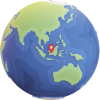Case studies are organised by region, with each region featuring links to the countries where the case studies are located.
Chile

Large-scale copper robberies orchestrated by organised crime groups have had a devastating impact on the Chilean copper industry. For instance, on the 11th of January 2023, 13 shipping containers, valued at $4.4 million, were stolen from the port of San Antonio after guards were subdued and cameras disabled. The Antofagasta Bolivia Railway (FCAB) has also reported over 100 attacks on copper-carrying trains from 2020 to 2023, with 39 incidents in 2022 alone. Gangs, equipped with advanced technology and heavy machinery, conduct these raids with paramilitary precision. These robberies are also highly violent, as shown when armed men kidnapped workers in Antofagasta to facilitate a copper robbery in May 2021. Organised crime groups also frequently attack police and companies’ security teams, sometimes resulting in murder. The scale and level of violence of these copper robberies has increased drastically over the past few years. While copper robbery has always been frequent in Chile, the methods used are now much more developed, allowing for better organised, larger and more effective heists.
Keywords: Latin America, Chile, minerals, copper, serious organised crime
Sources: https://insightcrime.org/news/chile-copper-industry-robbers-ports-trains/
Colombia

Mongabay reports on a case in Colombia’s tropical Andes, where a group of farmers and villagers are resisting the construction of a large copper mine by international gold mining giant AngloGold Ashanti. The company has been working for over a decade to obtain a license to extract nearly 1.4 million metric tons of copper from the mountains surrounding the town of Jericó. Concerned about the impact of the mine on their underground water supply, the group blocked the company from performing the final environmental studies needed for its pending mining license. The company claims that the mine would bring in around $5 million in annual profit for the town and create at least 3,000 jobs. However, the town is sharply divided over the issue.
Farmers fear their livelihood will vanish if the mine disrupts the water table. The area is predominantly agricultural and has never been a mining zone. The potential impact of the mine on the aquifer and the farmers’ water sources isn’t clear yet. The farmers and villagers have kept constant watch on the land rented by the company and have disrupted operations. As of mid-May, the legal process was still ongoing, with the town’s police inspector in charge of mediation between the two sides. Despite the resistance, AngloGold Ashanti has invested millions of dollars in Jericó since it first launched the project in 2010.
Keywords: Latin America, Colombia, minerals, procurement of permits, copper
Source: https://news.mongabay.com/2024/05/in-a-village-divided-farmers-stall-massive-copper-mine-in-colombian-andes/

Research from NGO Verité found that up to 91% of Venezuela’s and 87% of Colombia’s gold exports are illegally produced, often controlled by organised crime groups backed by large-scale investments. Some of the world’s most active organised crime groups and non-state armed groups are reportedly directly involved in the production and sale of such illegal gold, including Mexico’s Sinaloa cartel and Italy’s ’Ndrangheta mafia, as well as Brazilian, Russian, and Chinese syndicates.
Illegally produced gold from Latin America is exported to refineries (with the help of corrupt officials), melted down and blended with legally produced and scrap gold, or mixed to make alloys, then exported to global markets. Canada and the US are the biggest importers of Latin American gold – indeed, the latter’s gold imports from Latin America exceed the volume of gold that Latin America claims to export.
Whilst Switzerland is responsible for refining around 70% of globally-produced gold, some of the county’s refineries have stopped purchasing gold from Latin American suppliers linked to illegal gold mining and human rights abuses, leaving a gap in the market which US refineries have rushed to fill, purchasing this surplus gold in Switzerland’s place and introducing it to global markets. Indeed, Verité found that 90% of the Fortune 500 companies that filed conflict mineral disclosures last year (from across telecoms, IT, car manufacturers, and machinery producers) had purchased gold from refineries linked to illegally mined gold from Latin America.
In 2022, over 320 illegal gold mines were counted in the nine states that make up Brazil’s Legal Amazon. Major drug trafficking factions, including the Primeiro Comando da Capital, have infiltrated mining operations in Indigenous territories, running protection rackets, extorting taxes, controlling pits, and forging partnerships with gangs in neighbouring Venezuela to sell contraband minerals. Gold is also the top export of Bolivia, with the mining region transecting national parks and reserves.
Keywords: Latin America, Colombia, minerals, gold, primary production, serious organised crime illegal mining, corruption and bribery, drug trafficking, tax evasion, Indigenous rights, human rights violations, gold trafficking
Source: https://www.theguardian.com/global-development/2016/aug/16/illegal-mines-local-mafia-take-shine-off-latin-american-gold-peru
Côte d'Ivoire

The Institute of Security Studies reports that extremist groups are involved in illegal artisanal gold mining in Côte d'Ivoire. Gold mining activities are concentrated in areas like Bagoué, Bounkani, and Tchologo in the north of the country, as well as in protected areas like the Comoé National Park. Extremist groups typically use intermediaries to interact with local miners, using subsequent earnings to finance their operations. They provide financial support and operational equipment to the miners in exchange for a share of the gold produced or at reduced prices. The presence of extremists has created a climate of fear among local miners, with many miners experiencing encounters with armed groups who demand gold. This presence has led to a decrease in mining activities, as miners are afraid to operate in areas controlled by extremists. The report also gives the example where a miner from Burkina Faso described how he was approached by jihadists who offered financial support and a secure market for his gold. The miner eventually fled to Côte d'Ivoire due to the risks involved. Overall, the extremist groups' involvement in gold mining has both economic and social repercussions, disrupting local economies and contributing to insecurity.
Keywords: Sub-Saharan Africa, Côte d'Ivoire, minerals, gold, primary production, illegal mining, conflict and terrorist financing
Sources:
https://issafrica.s3.amazonaws.com/site/uploads/war-44.pdf
Democratic Republic of the Congo

The United States (US) sanctioned international mining magnate Dan Gertler for amassing a billion-dollar fortune through opaque and corrupt mining deals in the Democratic Republic of the Congo (DRC). In 2017, Gertler was sanctioned for allegedly using his close friendship with then President Joseph Kabila to act as an intermediary for mining asset sales in the DRC, which created a system where multinational companies had to go through Gertler to do business with the Congolese state. According to the US, the DRC reportedly lost over $1 billion in just two years due to Gertler’s corrupt deals. Despite being sanctioned by the US, Gertler was able to continue operating in the DRC’s mining sector through an international money laundering network that spanned from the DRC to Europe and Israel. In one instance, Gertler acquired new mining permits through proxy companies in the lead up to the 2018 Congelese elections. Moreover, as of 2022, Gertler was still reportedly earning millions of dollars from copper-cobalt mining interests in the DRC despite US sanctions.
Keywords: Sub-Saharan Africa, Democratic Republic of the Congo, minerals, cobalt, copper, corruption and bribery, sanctions evasion, money laundering
Source: https://home.treasury.gov/news/press-releases/sm0243

The Democratic Republic of Congo (DRC), a leading cobalt supplier, is grappling with environmental and human rights issues due to industrial cobalt mining. A report by RAID and AFREWATCH reveals that toxic pollution from cobalt mining in and around Kolwezi, the heart of DRC’s cobalt industry, is devastating the lives of hundreds of thousands of Congolese people. The report challenges the narrative of ‘clean’ and ‘sustainable cobalt’ promoted by multinational mining companies. It highlights the impacts of water pollution, including health issues among local residents and destructive consequences on local ecosystems and agriculture. The report underscores the urgent need for sustainable practices and effective regulations to protect the DRC’s communities and environment and calls for companies buying cobalt to ensure responsible sourcing.
Keywords: Sub-Saharan Africa, Democratic Republic of Congo (DRC), minerals, cobalt, primary production, human rights violations
Source: New report exposes the environmental and human costs of DRC’s cobalt boom - RAID (raid-uk.org)
Ecuador

Los Lobos, a narco-trafficking gang affiliated with Mexico’s notorious Jalisco New Generation cartel, has infiltrated illegal gold mining in Ecuador. Their activities have reached remote areas, including Podocarpus National Park, where they extort miners and dominate almost all stages of the gold supply chain. Each miner is forced to pay an extortion fee of up to $1,000 every month to the gang, leading to violent clashes in instances of non-compliance, with several local officials opposed to illegal mining being attacked or even murdered.
As criminal organisations in the region who have traditionally focused on drug trafficking expand into other criminal activities, the rising value of gold on international markets and the ease of laundering profits from the cocaine trade have made gold mining increasingly attractive to them.
Keywords: Latin America, Ecuador, mining, primary production, gold, serious organised crime, drug trafficking, illegal mining, murder, money laundering, extortion
Source: https://news.mongabay.com/2024/05/ecuadors-los-lobos-narcotrafficking-gang-muscles-in-on-illegal-gold-mining/

The high demand for gold, which has not dropped below $1,500 per troy ounce since the onset of the Covid pandemic, has led to an increase in illegal gold mining and gold exports in Ecuador. This activity is facilitated by factors such as high levels of informality and poverty, the presence of mineral deposits in remote areas, and the existence of illegal mining networks in neighbouring Colombia and Peru.
In the absence of state enforcement, the Indigenous A’i Cofán people of Sinangoe, Ecuador, have mobilised against this illegal gold mining. The group patrols a territory of 243 square miles, stretching from the Andean foothills down into the Amazon rainforest. They are on the lookout for alluvial gold miners who invade their land with heavy machinery and tear up the banks of their sacred river, the Aguarico.
Last year, Ecuador’s highest court suspended 52 formal mining concessions on their land, which borders the Cayambe-Coca national park. However, illegal gold mining has grown significantly in Ecuador’s Amazon. As of February 2023, it had devoured 1,660 hectares of forest. In January, Ecuador’s president, Guillermo Lasso, declared the activity to be a threat to national security. At the same time, the formal sector has grown, with the country’s mining exports growing 34% between January and November 2022 to $2.52 billion.
Keywords: Latin America, Ecuador, mining, gold, primary production, illegal mining, Indigenous rights, environmental crime
Source: https://www.theguardian.com/global-development/2023/nov/13/illegal-gold-mining-ecuador-amazon-ai-cofan-indigenous-guardians-mobilise
Equatorial Guinea

In 2022, the Swiss mining giant Glencore International was found responsible for sending cash bribes and corrupt payments to Equatorial Guinea, amongst other African countries such as Cameroon, Ivory Coast and Nigeria. Prosecution against Glencore International was a coordinated effort across several civil authorities in the U.K., U.S. and Brazil. The U.K.’s Serious Fraud Office (SFO) opened its investigation into Glencore’s activities in Equatorial Guinea in 2019, and uncovered a trail of text messages, large cash withdrawals and deliberately concealed payments.
Glencore paid bribes worth a total of US$29m in order to secure access to oil. It was also exposed that the company used high-profile agents to funnel bribes into state-owned oil companies and government ministries, often disguising bribes as unspecified ‘service fees’ or ‘success fees’ in reports. In addition, Glencore and some of its employees were convicted by the U.S’s Commodity Futures Trading Commission (CFTC) for manipulating benchmark price assessments for fuel oil products between January 2011 and August 2019. This manipulation was aimed at artificially inflating or deflating prices to benefit Glencore's physical contracts and derivative positions.
Keywords: Sub-Saharan Africa, Equatorial Guinea, minerals, primary production, corruption and bribery
Sources: https://www.justice.gov/opa/pr/glencore-entered-guilty-pleas-foreign-bribery-and-market-manipulation-schemes
https://www.sfo.gov.uk/2022/11/03/glencore-energy-uk-ltd-will-pay-280965092-95-million-over-400-million-usd-after-an-sfo-investigation-revealed-it-paid-us-29-million-in-bribes-to-gain-preferential-access-to-oil-in-africa/


The Environmental Crimes Financial Toolkit is developed by WWF and Themis, with support from the Climate Solutions Partnership (CSP). The CSP is a philanthropic collaboration between HSBC, WRI and WWF, with a global network of local partners, aiming at scaling up innovative nature-based solutions, and supporting the transition of the energy sector to renewables in Asia, by combining our resources, knowledge, and insight.


